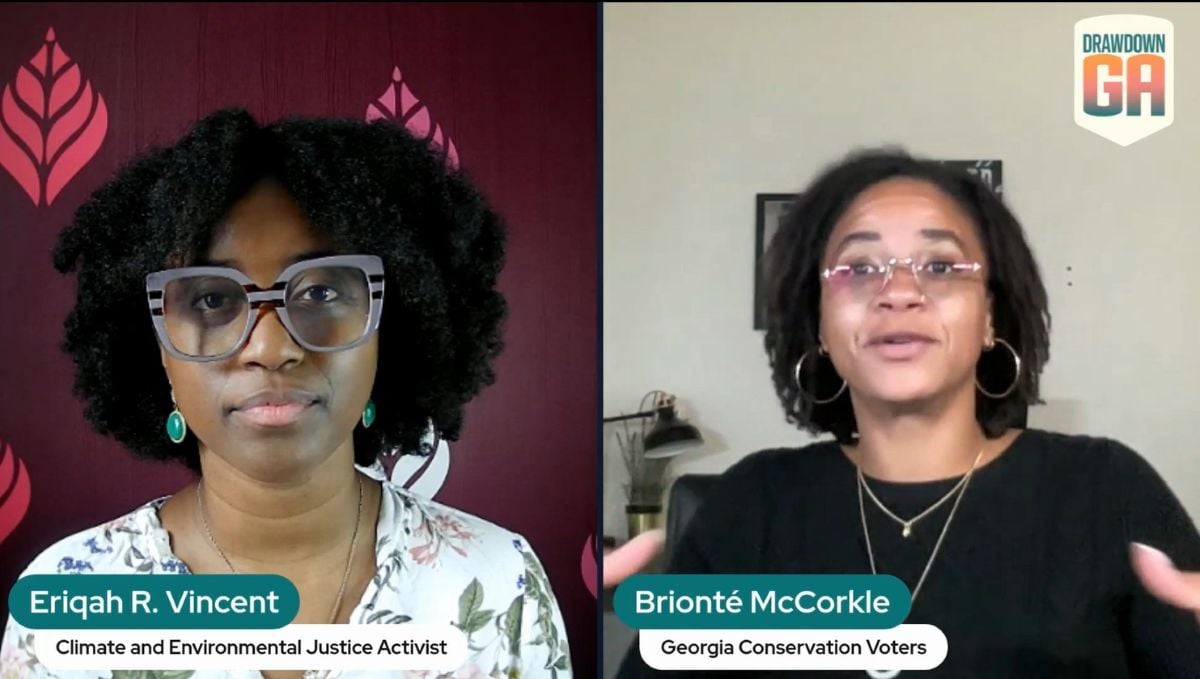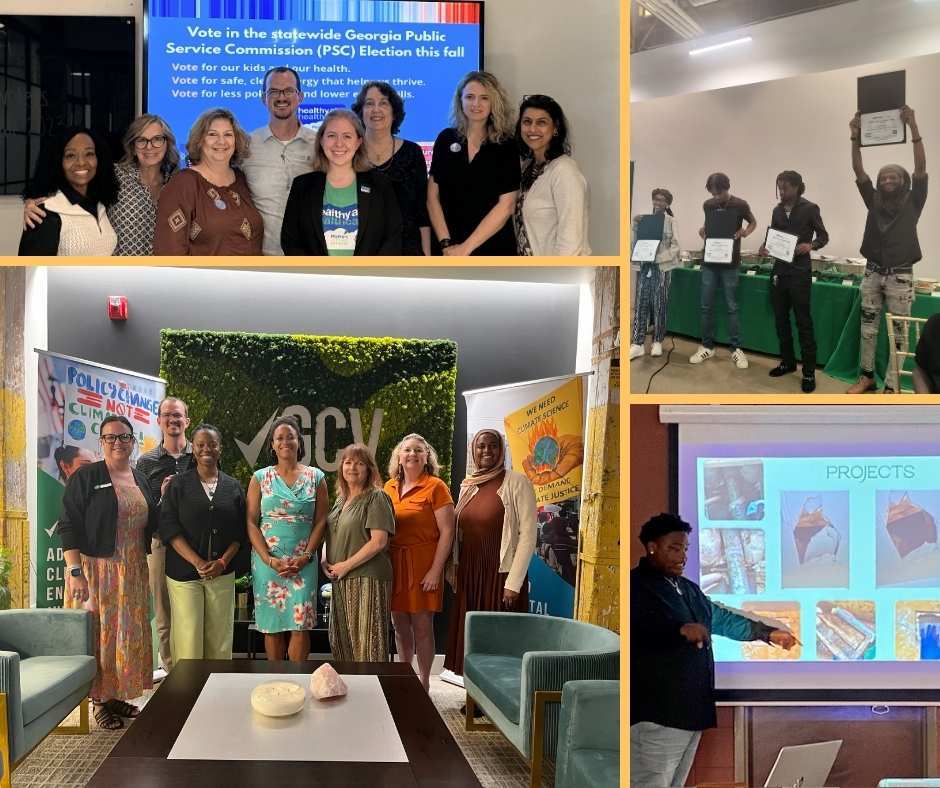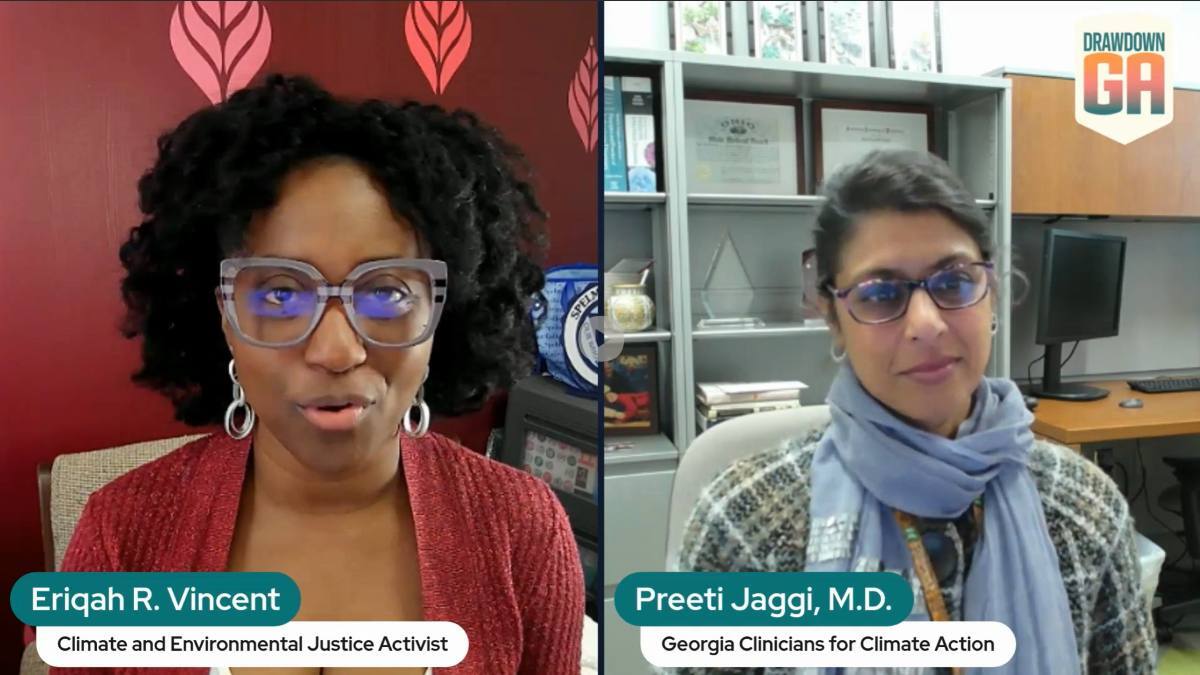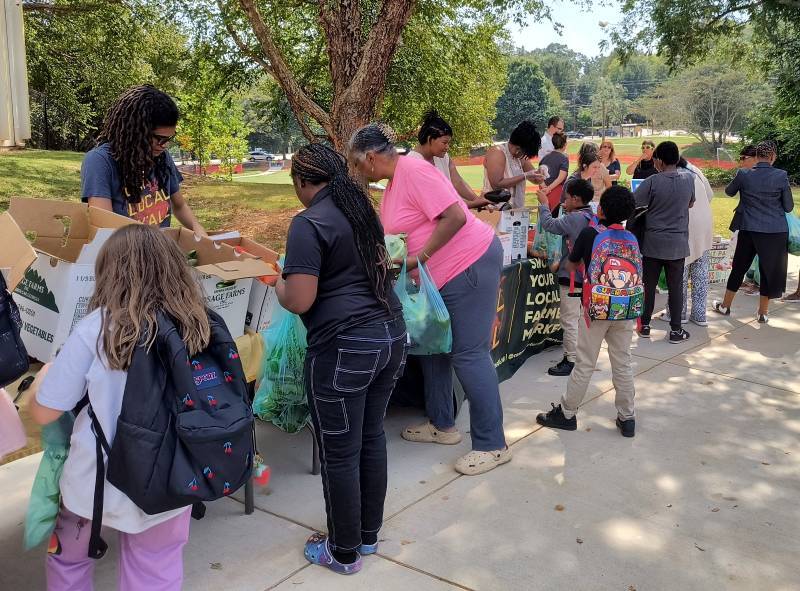Resilience and leadership can take many forms in Georgia’s climate movement, from expanding rooftop solar in rural communities to empowering young voters to advocate for cleaner air and lower utility bills.
In this installment of the Drawdown Georgia Climate Digest video interview series, longtime climate justice advocate Eriqah Vincent sat down with Brionté McCorkle, Executive Director of Georgia Conservation Voters (GCV), to talk about how her team is organizing communities around clean energy and equity and why she believes hope is one of our state’s most powerful renewable resources.
Watch the video above to hear their full conversation, or keep reading to learn how GCV is working toward a just energy future for all Georgians.
From Mojave Desert Roots to Georgia Forests
Brionté’s love for the environment started the moment she arrived in Georgia as a child.
“Moving to Georgia when I was really young opened my eyes to just how amazing the environment was,” she recalled. “I had been living in the Mojave Desert on a military base, so my early childhood was sprinkler systems and trees held up by sticks. Then I moved to Georgia, and I was just really blown away by the thick landscape of trees.”
That early awe grew into a lifelong calling. During college, a global politics course opened her eyes to the urgency of climate change. “When we got to climate change, that really ignited a fire in me,” she said. “I felt like this issue—how people live on the planet—is so fundamental and very much at risk. Other issues really take a back seat if the planet’s systems are collapsing.”
It was then that Brionté decided to dedicate her career to protecting the planet, guided by the understanding that climate, justice, and community well-being are deeply interconnected.
Centering Equity and Empowerment
When Brionté took the helm at GCV in 2019, she saw an opportunity to rebuild an established organization with equity and justice at its foundation.
“It was an opportunity to make sure that racial equity, justice, and environmental justice were really centered in the work from day one,” she said. “Most of the organizations I had been a part of were on a journey to becoming more inclusive. I wanted to build something with those values embedded from the start.”
Under her leadership, GCV has become a hub for building civic power across Georgia’s diverse communities, especially among groups that are often most impacted by climate change but least represented in environmental decision-making.
“We focus on building power with Black, Latino, Asian, Indigenous communities, young people under 40, and women,” she explained. “When we look at who is most impacted by climate change and environmental injustices, it typically tends to be those groups. And when you assess who’s concerned about the issue, they also rise to the front.”
Energy, Affordability, and Democracy
For GCV, the path toward a more just and sustainable Georgia runs straight through energy policy. “When we looked at what was impacting people most, like most Americans, it was the cost of living,” Brionté said. “Especially energy bills. People were reporting trouble paying their utility bills and said they’d been rising faster than inflation.”
Those conversations led GCV to focus on energy equity: working to make clean, affordable power accessible for all Georgians while building local leadership around decision-making. Much of that work has centered on Georgia’s electric membership cooperatives (EMCs), which serve millions of residents outside of Georgia Power’s service area.
Through support from a Drawdown Georgia Climate Solutions and Equity grant, GCV launched a major organizing effort around EMCs, helping residents understand their role as member-owners who can vote—and even run—for local board seats.
“We created a scorecard to see how transparent these EMCs are,” Brionté explained. “Do people know they have board members? Do they know they can run? Because if you are a member-owner, you do have the ability to vote and to serve.”
The findings revealed plenty of room for improvement: “Nobody got great scores,” she said. “The highest were Cs, mostly Ds and some Fs.” But the process sparked conversations about energy democracy and how local communities can shape the future of clean energy in Georgia.
From there, GCV launched People Empowered for Clean Energy in Georgia, a network of EMC members organizing to advance renewables, improve transparency, and support local candidates who share their vision. “It’s also about leadership development,” Brionté said. “Empowering community members to not just participate, but also step up and take leadership.”
>> Read more about Georgia Conservation Voters’ efforts to organize EMC members.
Connecting the Dots Between Power and Policy
Eriqah noted that many Georgians are unaware of the connection between their local energy providers and state decision-making through the Georgia Public Service Commission (PSC). Brionté agreed that helping people “connect the dots” is part of effective organizing.
“You have to meet people where they’re at,” she said. “Even if you’re not directly paying a Georgia Power bill, the Public Service Commission’s decisions still impact you, because your EMC is buying power from Georgia Power at wholesale.”
She added that new trends, such as the rapid expansion of energy-hungry data centers, are giving communities even more reason to get involved. “People are starting to ask, ‘How does this impact me? Is my bill going to go up because this data center is being built down the street?’”
Brionté believes that this moment is pivotal for Georgia’s energy future. “The decisions being made now are going to be lasting decisions for the next several decades,” she said. “Our first coal-fired power plant was built over a hundred years ago, and we’re still living with that legacy. This is a moment for us to create a different legacy.”
Building a Movement of Movements
While energy is GCV’s core focus, Brionté emphasized how interconnected all climate solutions are—from transportation and development to food systems. “The energy conversation is deeply connected to everything else,” she said. “The more that we get people involved locally, the better. That’s where decisions are being made about what our communities look and feel like.”
She also spoke about GCV’s involvement in the Georgians Organized to Survive and Thrive (GOST) coalition, which brings together partners across the Drawdown Georgia network. “Each of us is doing a little different part of the work that’s necessary for us to make the change we’re looking for,” she said. “Some people are working in the faith community, some on workforce development, some on legal strategies. All of these things add up to a movement toward the future we want to see.”
Staying Hopeful in the Work
When asked what gives her hope, Brionté’s answer reflected both strategy and spirit.
“What gives me hope is that people are being more honest about the barriers and challenges,” she said. “There’s a lot more willingness to be bold and try new things to engage people in this work.”
For those who feel overwhelmed or hopeless, Brionté offered a perspective rooted in history. “The climate crisis wasn’t built overnight,” she said. “We built our civilization around fossil fuels, but now we know how to do better. This is our opportunity to build something new.”
She compared today’s movement to past moments of struggle and transformation. “There are times in history where things are dark and don’t feel good, but there’s always a community of people keeping that drumbeat moving forward,” she said. “We’ve got to be those people. Even if we’re not going to see the benefit, our children will—and that’s worth everything.”
Get Involved
Georgia Conservation Voters offers numerous opportunities to participate, including volunteering, donating, and attending virtual events or community meetups. Brionté encourages everyone to “plug in where you’re interested, meet people, and be part of a community of folks who really care about this issue.”
You can explore GCV’s EMC Scorecards online and learn more about events, resources, and ways to volunteer at GCVEdFund.org.
Stay Connected
The Georgia Climate Digest video interview series shares stories from the people and projects that are leading the way to a more equitable and sustainable future for our state. Subscribe now to the Georgia Climate Digest to receive future interviews, local climate news, and inspiring stories of progress delivered right to your inbox.









